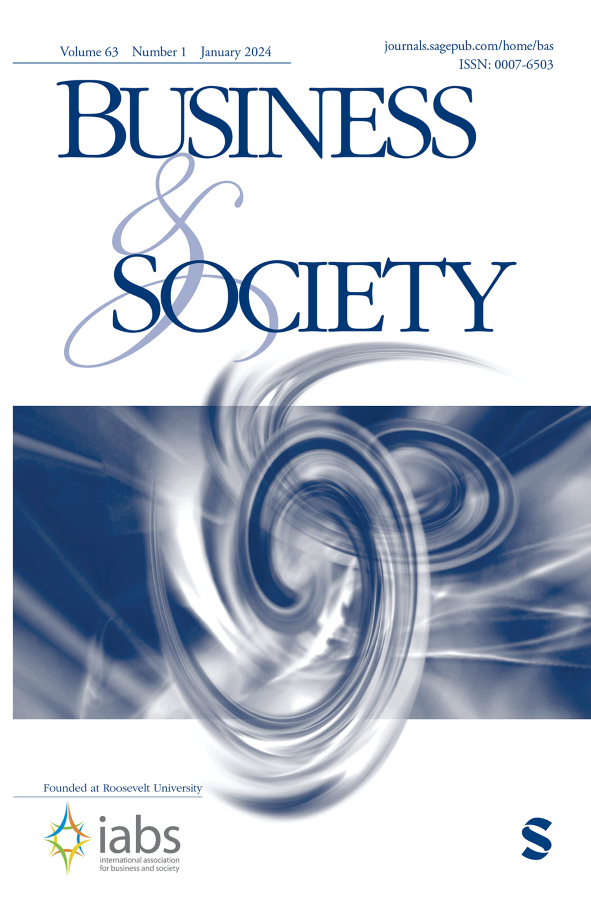Moral CSR
IF 6
3区 管理学
Q1 BUSINESS
引用次数: 3
Abstract
Corporate social responsibility (CSR) is about the moral purpose of business and its proper relationship to society. We map the logical structure of CSR—its canonical core—and identify the view of CSR that is most consistent with CSR as driven by moral purpose as Moral CSR (CSRM). The numerous perspectives of CSR, which we term CSR memes, are complements to CSRM. A meme is an idea or usage diffusing within communities. Moral norms and what we term normatively injunctive warrants are implicit in many CSR memes but have received a relative lack of explicit and systematic attention. A norm is an accepted standard for behavior. A warrant is an authoritative or authorizing instruction for behavior. All CSR memes contain three elements—a corporate actor, a relation, and nonmoral normative warrants, which we term constructive warrants. We argue that any CSR meme should include a fourth element—moral normative (injunctive) warrants linking explicitly to moral reasoning. Through sorting key CSR memes by their epistemological and compositional characteristics, we reveal the paucity of explicit attention to injunctive warrants. We resort memes according to social gains or losses, which are the outcomes of societal demand for and business supply of CSR. This analysis yields two proposed improvements for CSR reasoning. The first is a clearer picture of variable use of the term CSR in extant research. The second is how scholars can incorporate more explicitly moral elements of CSR in future work.企业社会责任是指企业的道德目的及其与社会的适当关系。我们映射了企业社会责任的逻辑结构——它的规范核心——并将与企业社会责任最一致的由道德目的驱动的企业社会责任观点确定为道德企业社会责任(CSRM)。CSR的众多视角,我们称之为CSR模因,是对CSRM的补充。模因是一种在社区中传播的想法或用法。道德规范和我们所称的规范性禁令令隐含在许多CSR模因中,但相对缺乏明确和系统的关注。规范是公认的行为标准。搜查令是对行为的权威或授权指示。所有企业社会责任模因都包含三个要素——企业行为人、关系和非口头规范性认股权证,我们称之为推定认股权证。我们认为,任何CSR模因都应该包括第四个元素——明确与道德推理联系在一起的道德规范(禁令)保证。通过根据关键的CSR模因的认识论和组成特征对其进行分类,我们揭示了对禁令令缺乏明确关注的现象。我们根据社会收益或损失来使用模因,这是社会对企业社会责任的需求和商业供应的结果。该分析得出了CSR推理的两个改进建议。第一个是对现有研究中企业社会责任一词的可变使用有更清晰的了解。第二个问题是学者们如何在未来的工作中更明确地融入企业社会责任的道德元素。
本文章由计算机程序翻译,如有差异,请以英文原文为准。
求助全文
约1分钟内获得全文
求助全文
来源期刊

Business & Society
BUSINESS-
CiteScore
14.80
自引率
11.40%
发文量
56
期刊介绍:
Business & Society publishes original research, book reviews, and dissertation abstracts relating to business ethics, business-government relations, corporate governance, corporate social performance, and environmental-management issues. Manuscripts relating to the field of business and society in general are also published. Submissions of theoretical/ conceptual work as well as empirical studies are encouraged. Business & Society is the first peer-reviewed scholarly publication devoted exclusively to the field of business and society, and it is the official journal of the International Association for Business and Society (I.A.B.S.), the only independent professional association dedicated to business and society teaching and research.
 求助内容:
求助内容: 应助结果提醒方式:
应助结果提醒方式:


